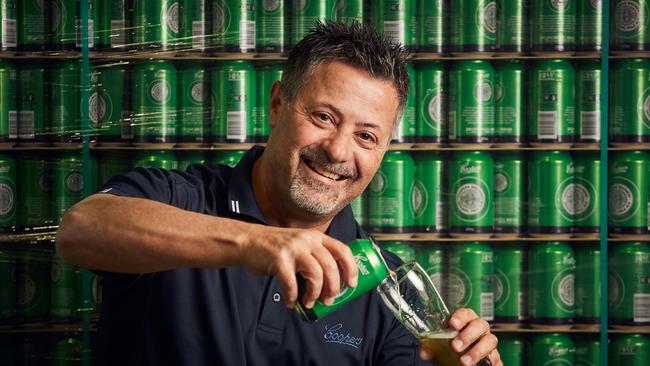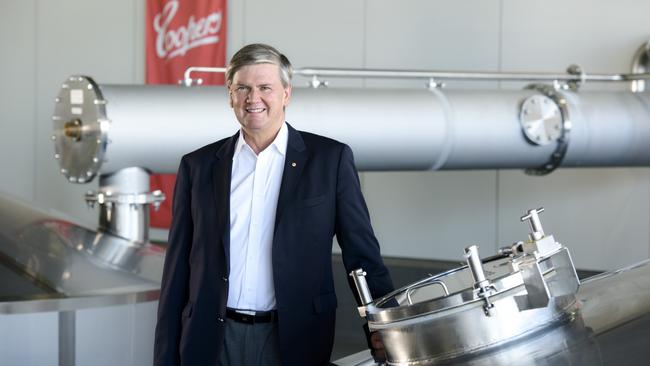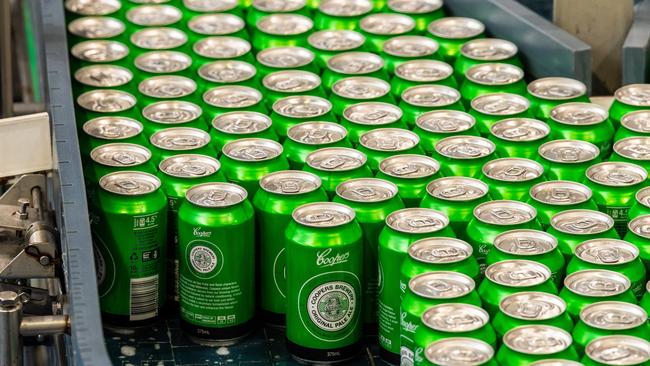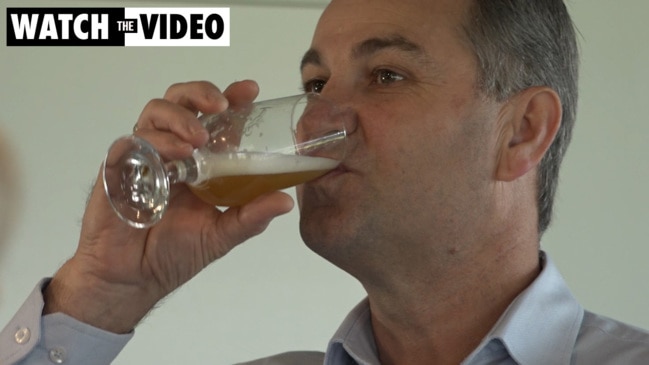Coopers Brewery outpaces the industry with canned beer sales driving growth
Sales of Coopers Pale Ale in cans has underpinned a strong result for the Adelaide brewery, in a year in which keg beer sales plummeted across the industry.

Coopers Brewery continues to outpace the broader beer market with a flight to well-loved brands and the ongoing success of its strategy to sell more beer in cans underpinning a strong result for the past financial year.
The brewery has also announced plans to invest $15m in a new warehousing facility at its Regency Park headquarters, which will boost its beer storage capacity by almost 50 per cent.
Coopers managing director Dr Tim Cooper said the company “had a lot to be grateful for’’ after announcing beer sales for FY21 had come in at 82.3 million litres, up 2.8 per cent and just shy of the record of 83.8 million litres hit in 20161-7.
Dr Cooper said after a drop in beer volume across the industry of 5.2 per cent in FY20, there was a slight recovery, up 1.8 per cent, for the past financial year, with Coopers’ result coming in over the top of this.

Coopers delivered an improved profit before tax of $36.5m, up from $34.3m, with lower operational and external expenses feeding in to the result, Dr Cooper said.
The strong result was down to people gravitating towards “authentic brands” as a result of the uncertainty caused by the pandemic, Dr Cooper said - a phenomenon which has been replicated elsewhere in the fast moving consumer goods market.
READ MORE:How Coopers is taking on the microbrewers
The company’s decision to package more beer in cans, with canned Pale Ale introduced in 2018, also continues to pay off, with the format now making up more than 30 per cent of packaged beer sales, up from less than 6 per cent in 2018.
Dr Cooper said sales of the flagship Pale Ale had actually started to slip before the company introduced the canned format, but had come back strongly.
“That’s really taken off, and subsequently we put Sparkling Ale in cans and introduced Session Ale, now called Pacific Pale Ale and XPA and so forth,’’ he said.
“Pale Ale was showing a bit of decline prior to us putting it in cans but that gave it a real shot in the arm.
“Coopers Pale Ale is our clear leader in this format but well supported by XPA, Sparkling Ale and Mild Ale, with the latter benefiting from a strong trend towards mid-strength beer.”

Prior to 2018 the company did sell Pale Ale in cans but it was branded as “Dr Tim’s”.
“And I always say that didn’t do anything for the sales because when it was called Dr Tim’s we were selling about 5000 cases a month and now we sell about 60,000 cases a month,’’ Dr Cooper said.
While packaged sales, which account for about 90 per cent of Coopers volume, were strong, keg sales were down sharply as a result of the pandemic keeping many venues across the eastern states shut,
“Bulk, or kegged beer, has continued to be under pressure, and was down 21 per cent on the volume of the 2019 financial year, but more than 35 per cent down on the peak volume of 13.4 million litres achieved 10 years ago in the 2011 financial year,’’ Dr Cooper said.
“However, overall, we’re seeing consumers continue to gravitate towards authentic brands they
can trust with emphasis on high quality and local provenance. That is driving demand for Coopers beer despite the pandemic still acting to suppress keg sales across the industry.

“The industry is in a fair state but we are still below 2019 numbers.’’
Internally the company prefers to use pre-pandemic 2019 numbers as the best comparison for sales performance.
Dr Cooper said sales had been lower than expected for the start of the current financial year, with industry-wide declines in volume.
Overseas sales of home brew kits were strong, up 31 per cent, while domestic sales “moderated” after strong growth the year before.
“Strong demand for Coopers’ high quality malt, particularly from new and existing international customers across Asia, has the plant operating at near capacity,’’ Dr Cooper said.
The new 5500 sq/m warehousing facility will be built adjacent to South Rd.
Coopers shareholders were paid a fully franked dividend of $13.50 per share during the financial year.
The company has also recently announced a share buyback with its more than 170 shareholders able to sell their shares back for $425 apiece.
This compares to the $310 per share which Lion offered in a failed buyout of the company back in 2005, with Coopers shareholders emphatically rejecting the bid which then valued the company at $420m.
Sales by state
- South Australia – up 6.6 per cent
- Northern Territory – up 6.0 per cent
- Queensland – up 3.0 per cent
- Victoria – up 1.8 per cent
- Western Australia – up 2.6 per cent
- New South Wales – down 0.2 per cent




To join the conversation, please log in. Don't have an account? Register
Join the conversation, you are commenting as Logout